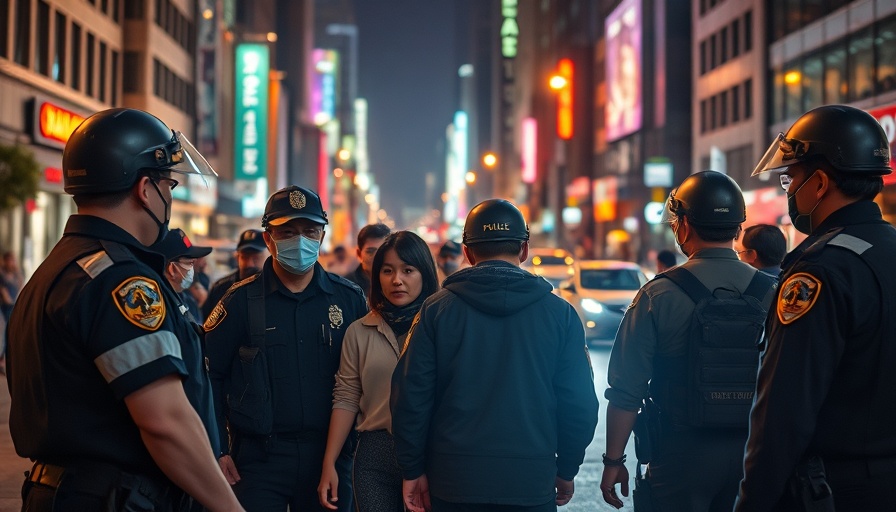
Trump's Bold Claim: A 'Crime Free Zone' in D.C.
In a controversial move that has sparked widespread debate, former President Trump recently declared Washington D.C. a "Crime Free Zone" as part of his ongoing federal crackdown on crime. This declaration follows an aggressive deployment of 800 National Guard troops into the city, which has reportedly led to over 550 arrests and a notable 40% decline in robbery rates. With crime in urban areas becoming a central focus in American politics, Trump’s statement seeks to not only bolster public safety perceptions but also reshape the national narrative on crime and law enforcement.
Understanding the Crime Landscape in D.C.
Washington D.C. has faced significant challenges with crime, especially violent crime, in recent years. According to reports, numerous factors contribute to this trend, including social unrest, economic pressures, and shifts in policing strategies. As urban settings grapple with complex issues, initiatives like the National Guard’s deployment aim to provide immediate relief to beleaguered communities while making strong political statements.
The National Guard's Role: More than Just a Military Presence
The presence of the National Guard in urban areas has a dual purpose: immediate crime reduction and the potential for long-term security solutions. Analysts argue that while increased enforcement can lead to short-term results, it’s vital to evaluate how such strategies impact community-police relations over time. For instance, the National Guard's involvement in D.C. can be seen as a direct response to civic demands for safety but may also raise concerns about militarization of the police in American cities.
Political Ramifications of the Declaration
Trump's proclamation is certainly more than a statement about local crime—it both reflects and influences the current political climate. It serves as a rallying cry for supporters who view law and order as paramount and challenges opponents who criticize what they see as an exaggerated portrayal of crime rates as a political tool. With crime being a pivotal issue in the upcoming election cycles, candidates will need to navigate this tricky narrative carefully.
Public Reaction: What do Citizens Think?
The response from D.C. residents has been mixed. Many feel encouraged by the apparent crackdown on crime, while others worry that labeling the city as a "Crime Free Zone" oversimplifies complex issues. Critics argue that real solutions should focus on addressing the underlying causes of crime, such as poverty and lack of opportunity, rather than just focusing on enforcement. Engaging in community dialogues and offering support programs could prove more effective in the long run.
A Broader Perspective: Crime Trends Across the U.S.
As Washington D.C. garners national attention, it’s important to contextualize these events within broader crime trends across the United States. Major cities such as Chicago, New York, and San Francisco have also seen spikes in violence, especially during periods of unrest. Various local governments have adopted different strategies—from policing to community programs—to mitigate crime, each with varying degrees of success. The varying responses to crime illuminate the need for tailored, city-specific approaches rather than one-size-fits-all policies.
Future Predictions: Will This Crackdown Work?
Moving forward, predicting the effectiveness of Trump's federal crackdown is complex. While immediate decreases in crime can signal success, the sustainability of such measures remains questionable. Experts suggest that true safety will only be achieved through systemic changes that empower communities, provide economic opportunities, and foster relationships between law enforcement and citizens. The evolving nature of crime policy will likely play a critical role in future electoral races, with candidates effectively needing to address both security and social justice concerns to garner support.
The above elements underscore the importance of this moment in America's ongoing discussion of public safety and governance. As citizens, staying informed about local and national news regarding crime is crucial for engaging in meaningful community discussions and advocating for effective solutions. Understanding the historical context and social dynamics at play can empower individuals to participate in shaping the future landscape of their communities.
In order to navigate the intricacies of this pressing issue, stay informed by following trusted news sources and engaging in local dialogues to better understand the implications of legislative policies and community safety initiatives. Your voice matters in creating a safer and more just society.
 Add Element
Add Element  Add Row
Add Row 



Write A Comment